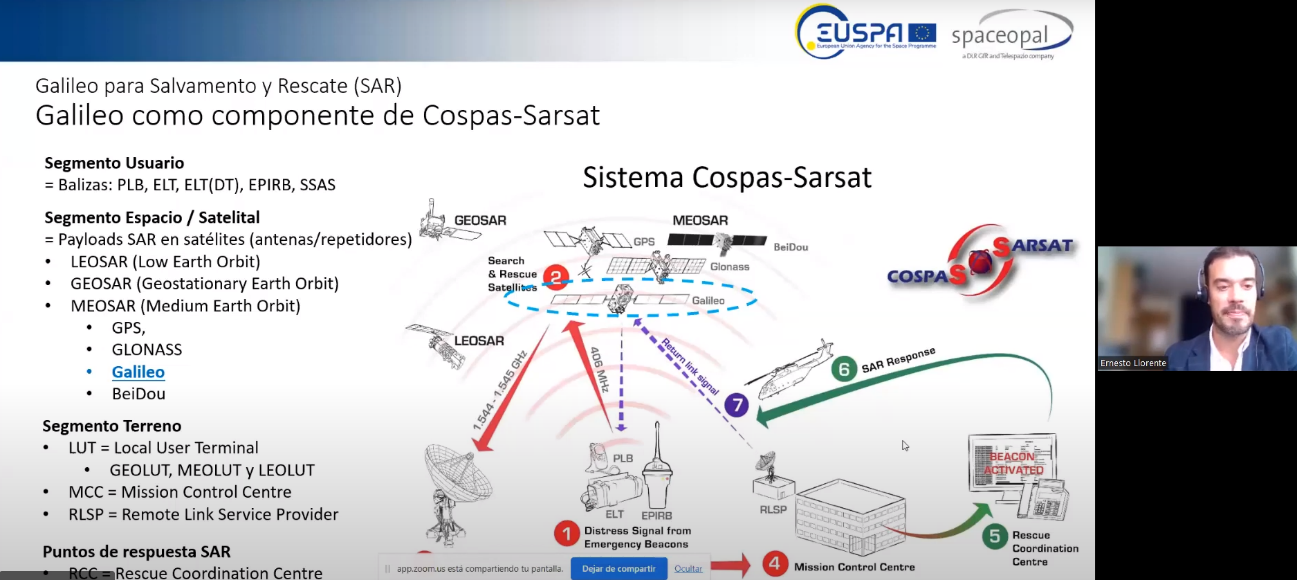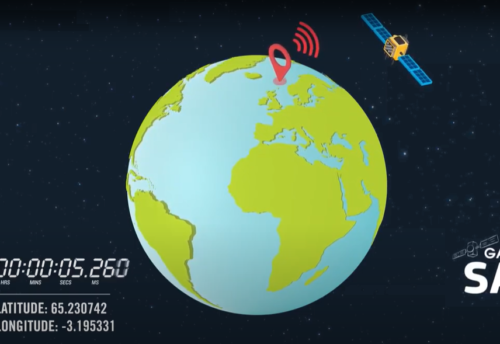
- 11/02/2023
The GIC Mexico introduced Galileo’s SAR Service and Copernicus, the European Earth Observation Programme
The Galileo Mexico Information Center organized informative talks for search and rescue teams from several countries to familiarize them with Galileo's SAR service and Copernicus.
Last October, the Galileo Information Centre for Mexico, Central America and the Caribbean organised two informative sessions to complement the Search and Rescue Operations Management course (2023) organised by the Humboldt Rescue Organisation of Venezuela.
The first talk was held on 20 October, dedicated to the Galileo SAR service as a component of Cospas-Sarsat and was given by Ernesto Llorente (GSC – GNSS Service Centre).
The main objective of the talk was to familiarize the rescue teams with the Galileo SAR service. Global Search and Rescue (SAR) operations quickly locate and assist people lost in hostile environments (sea, jungle…). The SAR/Galileo service, launched on December 15, 2016 as part of Galileo’s initial services, contributes to these life-saving efforts by rapidly transmitting radio beacon distress signals to SAR crews using payloads aboard Galileo satellites.
On January 21, 2020, the SAR/Galileo Return Link Service (RLS) was declared operational. Galileo now not only locates people in distress and makes their position known to the relevant authorities, but SAR/Galileo RLS provides an automatic acknowledgement message to the user informing them that their request for help has been received.
Regarding the possible future services that we want to offer from Galileo SAR, there are RBA-Remote Beacon Activation in aircraft (activation and tracking of beacons on demand), TWC-Two Way Communication (basic but effective communication between RCC and people in need), DPS -Distress Position Sharing (sharing the location of people in distress to seek potential help nearby) and EWS-Galileo Emergency Alert Service (alert specific regions about possible emergency situations).

The second talk was held on 27 October and focused on Copernicus, another European space programme, and was given by Teresa Martínez, EUSPA consultor.
The main objective of the talk was to raise awareness of the European Earth Observation and Monitoring Programme and the services it offers in the areas of atmospheric, marine and land monitoring, climate change, security, and emergencies.
Copernicus looking at our planet and its environment to benefit all European citizens. It offers information services that draw from satellite Earth Observation and in-situ (non-space) data. Through in situ and satellite observations, Copernicus services provide global data in near real time, also applicable to local and regional needs, allowing us to better understand our planet and sustainably manage the environment in which we live.

Among those attending these talks were representatives of Rescue Organisations, Firefighters, Mountain Guides, Coastguards, Air Forces, Navy and Air Police Service from 28 countries: Andorra, Argentina, Belize, Bolivia, Chile, Canada, Colombia, Costa Rica, Czech Republic, Dominican Republic, Ecuador, El Salvador, Guatemala, Honduras, Italy, Mexico, Netherlands, Panama, Paraguay, Peru, Spain, Sweden, United States, United Kingdom, Uruguay and Venezuela.
The comments received from the students who attended the talks allow the GIC team to evaluate their participation very positively. Some of the comments received:
“I share the usefulness of the Copernicus EMS system, which has been of great help in identifying operational and humanitarian aid needs in my country, Mexico, with the passage of Hurricane Otis”, Helicopter pilot, Mexico.
“What we saw in the talk on Copernicus was a very enriching experience. To see how we can use this technology to serve our planet, how to prevent and also to take clear action on the different problems that arise in terms of weather, pollution and population. To have at hand a fabulous tool to be able to contribute to saving lives in our search and rescue work”, Aerocivil SAR Service, Colombia.
“The conference on the Galileo and Copernicus services was a great experience to learn how they work and their great usefulness in the observation of land, marine and atmospheric environments, emergency situations and climate change, as it will provide information in the public domain to authorities and international organisations to observe the environment in all its facets and is of great help to rescue agencies. Grateful for the talk and for the extensive information”, EMAT, Colombia.
“The SAR system entails devising a mobilisation operation by well-trained and skilled emergency response teams, whose main objective is to locate persons who may be considered missing. This programme is important from its genesis because of its comprehensive and free open data policy. This makes it an invaluable tool for the rapid development of SAR operations and a key factor in the digital economy as it has an infinite number of uses. Especially relevant is the systematic planning of the search and rescue scenario”, Bomberos de Bucaramanga, Colombia.
You can watch both sessions at Webinar – Galileo Information Centre Mexico | GIC Mexico (galileoic-mexico.com)



